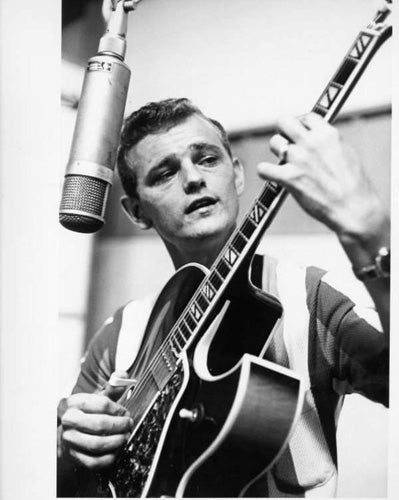Jerry Reed: Actor and country singer

Your support helps us to tell the story
From reproductive rights to climate change to Big Tech, The Independent is on the ground when the story is developing. Whether it's investigating the financials of Elon Musk's pro-Trump PAC or producing our latest documentary, 'The A Word', which shines a light on the American women fighting for reproductive rights, we know how important it is to parse out the facts from the messaging.
At such a critical moment in US history, we need reporters on the ground. Your donation allows us to keep sending journalists to speak to both sides of the story.
The Independent is trusted by Americans across the entire political spectrum. And unlike many other quality news outlets, we choose not to lock Americans out of our reporting and analysis with paywalls. We believe quality journalism should be available to everyone, paid for by those who can afford it.
Your support makes all the difference.If the epithet "multi-talented" is today regularly overused, it seems wholly appropriate when describing Jerry Reed. An award-winning country singer, he was also a fine songwriter – his "U.S. Male" and "Guitar Man" became substantial hits for Elvis Presley – as well as a highly influential guitarist and a popular film actor, starring in the Smokey and the Bandit trucker movies alongside Burt Reynolds.
Born Jerry Reed Hubbard (later dropping his last name) in Atlanta, Georgia, he spent much of his early childhood in care. At the age of nine his mother presented him with a second-hand guitar and taught him the two chords she knew. By the time he was in his teens he was working in the city's cotton mills by day and playing in its bars and clubs at night. He was spotted by a local disc jockey who introduced him to Ken Nelson of Capitol Records. He signed to the label at 17 and the following year cut his first single, "If the Good Lord's Willing and the Creeks Don't Rise".
After the termination of his Capitol contract he enlisted in the US Army, but continued to write. His songs were covered by a number of stars including Brenda Lee ("That's All You Gotta Do", 1960) and Porter Wagoner ("Misery Loves Company", 1962). A brief tenure with Columbia resulted in a couple of minor hits, and then, in 1965, he signed with RCA. Encouraged by the producer-guitarist Chet Atkins to bring more of his own personality to his work, he recorded "Guitar Man" in 1967 and gained the attention of Elvis Presley, who went on to record the song along with "U.S. Male" a year later; Reed himself played lead guitar on the sessions.
He had developed a characteristic syncopated guitar style that echoed his heroes, Merle Travis and the bluegrass banjo virtuoso Earl Scruggs; it was eventually dubbed the "claw" in recognition of the way his hand looked as he played. In 1970 he showcased the style on an album of instrumentals with Chet Atkins, Me and Jerry. The record won a Grammy and was followed, two years later, by Me and Chet.
Reed's chart breakthrough came with the swamp rock-infused "Amos Moses" in 1970, which enjoyed success on both the pop and country charts. Appearances on The Glen Campbell Goodtime Hour television show gave him greater exposure and led to his first country chart-topper, "When You're Hot, You're Hot" (1971), a tale about crap-shooting which won him another Grammy. Subsequent hits included "Ko-Ko Joe" (1971), "Smell the Flowers" and "You Took All the Ramblin' Out of Me" (both 1972), and Dick Feller's dissection of the American obsession with the automobile, "Lord Mr. Ford" (1973). In that same year, he revived "The Uptown Poker Club", a song that had long been synonymous with the actor and singer Phil Harris.
Although Reed continued to enjoy chart success throughout the 1970s, with hits including "The Crude Oil Blues" (1973), "A Good Woman's Love" (1974), "East Bound and Down" (1977) and the duet with his daughter Seidina, "You Know What" (1978), he became preoccupied by film work. Having worked with Burt Reynolds on W.W. and the Dixie Dancekings (1974), he formed a close friendship with the star, proving an effective antagonist in Gator (1976) and playing the trucker Cledus "Snowman" Snow in the Smokey and the Bandit trilogy (1977, 1980, 1983). In 1998 he starred alongside Adam Sandler as a coach in the American football comedy The Waterboy.
Appearances on the country chart became rare, but he scored in 1982 with the novelty hits "She Got the Goldmine (I Got the Shaft)" and "The Bird", the latter showcasing his talent for imitating his fellow country singers. Notable albums from this period included a fine tribute to the folk singer Jim Croce and, in 1992, another Grammy-winning series of instrumental duets with Chet Atkins, Sneakin' Around.
In 1998 he joined his fellow country veterans Bobby Bare, Waylon Jennings and Mel Tillis for a tongue-in-cheek project, The Old Dogs, and released The Gallant Few (2008), a fund-raising tribute to disabled ex-servicemen.
Paul Wadey
Jerry Reed Hubbard, singer, songwriter, guitarist and actor: born Atlanta, Georgia 20 March 1937; married 1959 Priscilla Mitchell (two daughters); died Nashville, Tennessee 1 September 2008.
Join our commenting forum
Join thought-provoking conversations, follow other Independent readers and see their replies
Comments